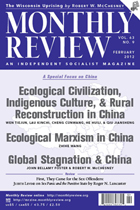Maoism
Should Ecuador's left work with the right against Rafael Correa?

Banker and opposition leader
Belgium: Left parties to form united electoral ticket
[For more on Belgium, click HERE.]
Statement by the LCR-SAP secretariat
China's 'bureaucratic capitalism'

Photo: Alex Mahan/Flickr.
Greece: Young revolutionary members of SYRIZA interviewed

Photo by Eric Ribellarsi.
June 18, 2012 -- Winter Has Its End/Kasama Project, posted at Links International Journal of Socialist Renewal at the request of the author. It has been slightly abridged -- Eric Ribellarsi met with 10 young members of the Communist Organization of Greece (KOE), which is part of the Coalition of the Radical Left, SYRIZA. [The KOE comes out of the Maoist tradition and is the second-largest component of SYRIZA.] They discussed their backgrounds, experiences, the student movement, the orthodox Communist Party in Greece (KKE), revolutionary strategy and the political choices of revolutionary communists within the Greek crisis. Eric Ribellarsi is part of a reporting team in Greece.
* * *
Can you tell me how some of you became communists? How did you come to join KOE?

[For more discussion on China's economic and political development, click HERE.]
By Kevin Lin
March 11, 2012 -- Green Left Weekly/Links International Journal of Socialist Renewal -- Rural protests make up a large part of overall social unrest in China. But such protests had not received prominent international attention until the siege of Wukan, a village of 12,000 in Guangdong province, late last year.
Just like the strikes in Honda plants in 2010, Wukan brought to light the deep-seated grievances of villagers in a dramatic way. The revolt featured the eviction of party officials and the police, the self-management of the village by villagers, and the stand-off against armed police in a siege for more than a week.
The Wukan protest was triggered by the local government's land expropriation without adequate compensation to the affected villagers. It was escalated by the death of a protest leader in police custody.
The villagers showed remarkable courage in occupying their own village against predictable state repression.
The class nature of the Chinese state
By Doug Lorimer
[The general line of this report was adopted by the 18th DSP Congress, January 5-10, 1999. This text is taken from The Activist, volume 9, number 1, 1999.]
The purpose of this report is to motivate the adoption by the party of the "Theses on the Class Nature of the People's Republic of China" approved by the National Committee at its October plenum last year.
Since 1993 our party has held the position that the ruling Chinese bureaucracy has been presiding over the restoration of capitalism in China. However, our policy toward China has been ambigious: while taking an oppositional stance in our public press toward the ruling bureaucracy's restorationist course, we have left it unclear as to whether we continued to believe that China is still a bureaucratically ruled socialist state.
China: Elite rule faces rising social and working-class struggles

[For more discussion on China's economic and political development, click HERE.]
By Kevin Lin
February 11, 2012 -- Green Left Weekly/Links International Journal of Socialist Renewal -- China’s transition to state-led capitalism over the past three decades has generated numerous social struggles against the state and capital. With China’s ascent in the capitalist world economy, the social struggles inside China not only have a significant domestic impact, but increasingly international ramifications.
As China celebrates the Year of the Dragon, it is an opportune time to critically review the situation for social struggles and their prospects for the future.
State and elite politics
India: Walking with the comrades, by Arundhati Roy
March 22, 2010
China: Marxism with capitalist characteristics?

[For more discussion on China's economic and political development, click HERE.]
Ian Parker reflects on a recent visit to China
November 9, 2011 -- Socialist Resistance -- Capitalism in China is rapidly uprooting and throwing into the marketplace all that seemed fixed and frozen since the revolution in 1949, but -- as with all other forms of capitalism -- this market is all but free. The bureaucracy holds in place systems of authority necessary for capital accumulation, and the Chinese state is a key player in the enrichment of a new bourgeoisie. There are particular political-economic and ideological conditions for this transition, of course, and one of the most important is the legacy of Maoism, and how the claim to be a socialist country is squared with the rapid abandonment of each and every tenet of socialism.
Québec Solidaire: A Québécois approach to building a broad left party

Amir Khadir, currently Québec solidaire's sole member of the Quebec legislature, the National Assembly.

